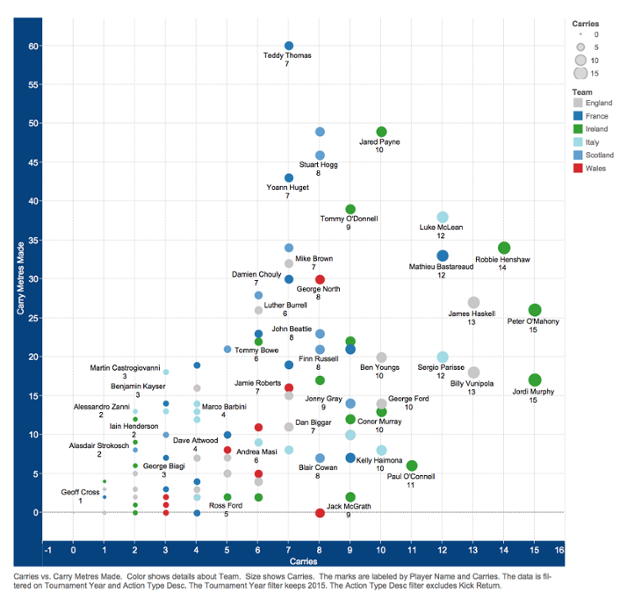Friday night started with a tunnel stand-off and ended with Wales paying for tunnel vision. It was not just that their power game based on gainline domination was dumped in rugby’s equivalent of the crusher but they had no answer to multi-dimensional opponents.
1) Wales were undone off the pitch and on
Wales thought they would psych out opponents they regarded as mentally suspect but after Stuart Lancaster refused to sanction the roof being shut, Chris Robshaw’s refusal to take his players on to the pitch until he knew Wales would follow quickly had the bloody-mindedness of Martin Johnson about it.
England did not buckle on the field either. They were on top in the scrum, where the Wales head coach, Warren Gatland, has to ponder whether Gethin Jenkins, a prop more effective in the loose than the tight, remains the No1; in the line-out; and ultimately at the breakdown. England had considerably more ideas behind, kicking initially and then playing more ball-in-hand, all the time handing off Wales’ rush defence and playing to their own strengths rather than their opponents’.
Gatland will ensure there is a reaction against Scotland on Sunday but his team are looking like flat-track bullies, vulnerable against anyone who stands up to them and has a semblance of wit. Gatland has talked all season about how the World Cup is the big picture for him but the clumsy attempts to disconcert England only made the tournament hosts, and group opponents, stronger. Wales do not have a larder as richly stocked as England; rather than bringing in new supplies, it is a matter of making what they have go further. Paul Rees
• Gatland did not talk after England defeat, says Webb
• The best pictures from the match
2) Lancaster gets the best out of England
Was this the best result of Stuart Lancaster’s England coaching tenure? There have been some eye-catching bursts of inspiration – New Zealand at Twickenham in 2012, France in Paris earlier that same year, the relieving win over the Wallabies in November – but their second-half comeback to win 21-16 was unquestionably their most consistently impressive all-round display away from home. If Wales contributed to their own demise, the visitors could easily have scored two more tries and won by a wider margin. Apart from some early problems at the breakdown and one or two oddly timed substitutions, England looked better balanced and increasingly confident. If they start the way they left off in Cardiff, Italy will not enjoy their visit to Twickenham this Saturday. Robert Kitson
• Lancaster keeping feet on the ground after Wales win
• Wales 16-21 England
• Eddie Butler: England can quickly plan ahead
3) France will struggle for style with big Bastareaud in their ranks
Mathieu Bastareaud is popular enough at the Stade de France and more industrious than his frame would appear to allow. He passed as much as he thundered against Scotland. But he seems to embody – and what a large body it is – a style stripped clean of subtlety. There was a lot of muttering around the Stade that boom bang is all very well but others do it better. So what do the French want? They are not sure but it has to be better than five penalties. Perhaps they crave explosive elegance, a sort of moulding of Thierry Dusautoir and Wesley Fofana into one hybrid, multiplied by 15. For the moment they have one big Bastareaud. Eddie Butler
• France 15-8 Scotland
4) Ireland must manage return of their world-class players carefully
Ian Keatley said after the win over Italy on Saturday that he presumed Johnny Sexton would return at fly-half for the France game this weekend. Sexton’s 12-week lay-off from rugby, following the concussion he suffered against Australia in November, his fourth in 12 months, expires the day before the French visit Dublin. Keatley is almost certainly right but Ireland have a delicate balance to strike, with a number of world-class players becoming available at the same time.
Does Joe Schmidt rush them all back? Jamie Heaslip’s lay-off has been short, so he will likely feature, but Schmidt could also in theory pick Sexton, Cian Healy and, subject to the results of a hamstring scan, Sean O’Brien. Healy has not played since September and O’Brien since December 2013. One world-class player looking for match fitness could possibly be accommodated (as O’Brien would have been against Italy but for his hamstring strain in the warm-up). More than that is pushing it. And there are others in the squad only recently returned from injury. Sexton will play against France, surely, and his concussion should not have affected his physical fitness, but managing his best players’ return to play will test even Schmidt’s acumen. Michael Aylwin
• Italy 3-26 Ireland
5) Do Scotland dare approach Wales test with such new-found abandon?
It is not often the losing team can extract more from a game than the winners but Scotland took huge pluses, if not much comfort, from Paris. They will never frighten the big beasts of the sport with their scrummaging, and they will have to work on stopping a driving maul from the lineout, but their defence was excellent and their fitness levels looked good too. And in attack – both spontaneously and with their pre-planned plays – they were adventurous and confident. Finn Russell looked the part, strong and yet light on his feet, and Stuart Hogg was sensational. Dare they approach the Wales game with abandon: you score six tries and we will score eight? Eddie Butler
• Laidlaw admits penalty count cost Scotland dearly against France
6) Italy’s tackle count is spectacular but they must tackle why
Italy now boast three of the top six tackle tallies in Six Nations history. This weekend they were credited with 205 against Ireland in the post-match stats, which would have been the second highest behind the extraordinary 245 they made against the same side last year (surely a world record). But overnight their tally was downgraded to 198, which drops them to fourth behind the 200 Ireland made against Wales in 2013 and, would you believe, the 199 England made in a 40-5 win over Italy in 2003. Italy’s tally at half-time on Saturday was 76, and in the 47th minute it flashed up on the screen as 130, which suggests they made 54 in a little over six minutes. It would be interesting to know how tackles are counted in these stats. Does a double tackle, for example, count as one for each of the tacklers (and therefore two towards the team tally)? And how accurately is it possible to keep track during a match? Whatever the answers, though, that was a remarkable shift Italy’s defenders put in. Their most pressing concern now is to work out why they keep having to do it. Michael Aylwin
Data: top carriers by metres carried

















